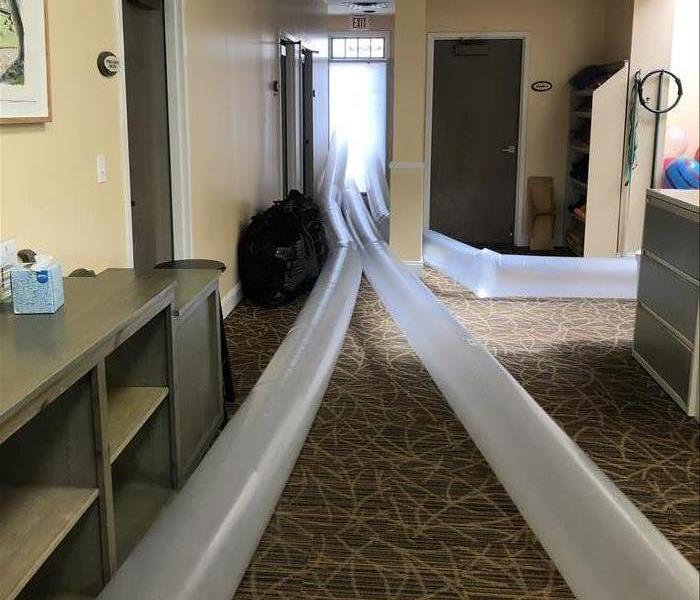Blog 3: Isolation and Ventilation Related to Viral Decontamination
6/1/2020 (Permalink)
 SERVPRO of Mandarin installs temporary ductwork to help ventilate the affected area, to cycle fresh air in from the outside.
SERVPRO of Mandarin installs temporary ductwork to help ventilate the affected area, to cycle fresh air in from the outside.
Isolation and Ventilation
Feasible engineering and work practice controls will be utilized by SERVPRO of Mandarin during viral decontamination services to minimize employee exposures to airborne infectious disease. Examples of engineering controls include airborne infection isolation rooms (AIIR), exhaust ventilation, air filtration, and air disinfection.xii
We will close off areas used by the ill persons and wait as long as practical before beginning cleaning and disinfection to minimize the potential for exposure to respiratory droplets.xiii This is normally accomplished by closing doors or erecting critical barriers with 6 mil polyethylene sheeting to facilitate source containment. The work area shall be locked when unattended. A Biohazard sign can be provided by SERVPRO of Mandarin and be posted at any potential entry point to the work area.
The CDC recommends opening outside doors and windows to increase air circulation in the area. If possible, we will wait up to 24 hours before beginning cleaning and disinfection.xiv Based on existing bioremediation standards, there is value in controlling airflow from affected to unaffected areas. To control the spread of aerosolized contamination, workers can put the contaminated area under HEPA-filtered negative air pressure. This air should be exhausted outside the structure when practical. If possible we will engineer an air change rate of ≥6 mechanical air changes per hour (ACH).xvi
If utilizing negative pressure, pressure differentials will be monitored to ensure that air is always flowing from the surrounding area into the work area. Negative pressure can be monitored either continuously or periodically. Monitoring methods include chemical aerosols (e.g., smoke tube), differential pressure-sensing devices (e.g., manometer), and physical indicators (e.g., flutter strips).xvii If using a manometer, it is recommended to achieve a pressure differential of ≥0.01 inch of water gauge.xviiixix
xii https://www.dir.ca.gov/dosh/coronavirus/
xiii https://www.cdc.gov/coronavirus/2019-ncov/community/organizations/cleaning-disinfection.html
xiv https://www.cdc.gov/coronavirus/2019-ncov/community/organizations/cleaning-disinfection.html
xvi https://www.cdc.gov/mmwr/preview/mmwrhtml/rr5417a1.htm
xvii https://www.cdc.gov/mmwr/preview/mmwrhtml/rr5417a1.htm
xviii https://www.cdc.gov/mmwr/preview/mmwrhtml/rr5417a1.htm
xix https://www.cdc.gov/infectioncontrol/guidelines/environmental/background/air.html






 24/7 Emergency Service
24/7 Emergency Service